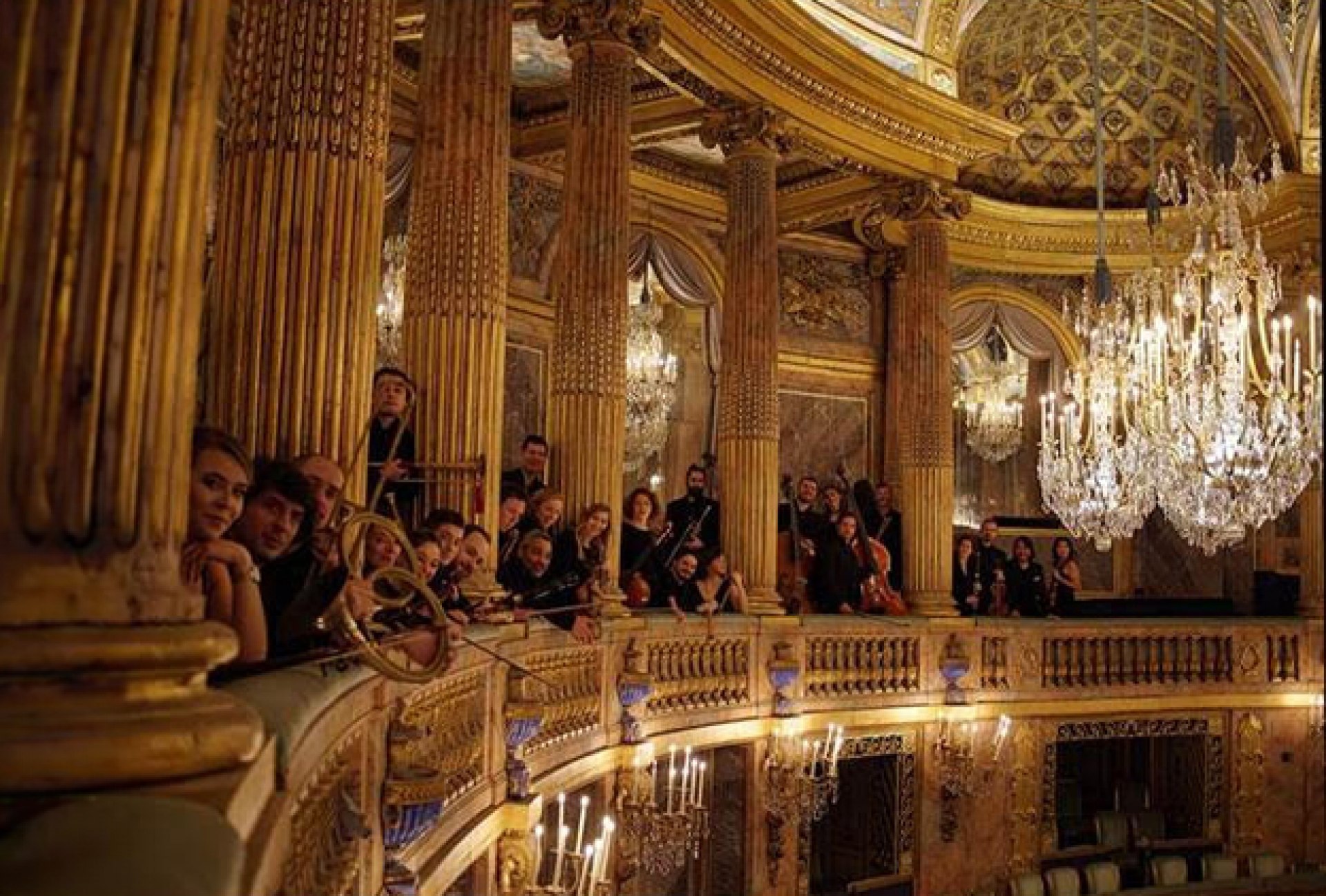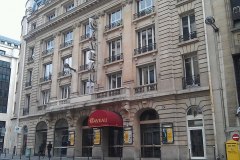Orchestra of the Royal Opera of Versailles
Mo | Tu | We | Th | Fr | Sa | Su |
Fauré: Requiem
100th anniversary of Fauré's death
Victor Jacob
"Revelation conductor" at the Victoires de la musique 2023 and "Special Mention" at the Besançon International Competition 2019, French conductor Victor Jacob is regularly invited by European and international orchestras. Among them the Orchestre National de Bordeaux, the Orchestre National de Montpellier, the Orchestra of the Royal Opera of Versailles, the Orchestra of the Rouen-Normandie Opera, the Mulhouse Symphony Orchestra and the Orchestre de Picardie. We can also mention several notable invitations for the symphonic repertoire: the Orchestre Philharmonique de Radio-France, the Orchestre Royal Philharmonique de Liège, the Orchestre National de Lyon, the Orchestre de Chambre Nouvelle-Acquitaine, the Belgium National Orchestra, the Orchestre National de Lille, the Orchestre National Avignon-Provence and the Orchestre du Capitole de Toulouse.
Regularly sharing the stage with international soloists (Katia Buniatishvilli, Michael Spyres, Gaëlle Arquez, Julie Fuchs, Lucienne Renaudin Vary, and Edgar Moreau), he is also invited to conduct the Simon Bolivar Orchestra and the Moscow State Philharmonia (МГСО) in Venezuela.
Principal conductor of the Paris Opera Youth Orchestra and former singer at the Maîtrise de Radio-France, Victor is particularly attentive to voices and at ease in the lyrical repertoire for which he perfected his skills with Antonio Pappano, Nathalie Stutzmann and Paolo Arrivabeni. In opera, he conducts the Paris Chamber Orchestra at the Théâtre des Champs-Élysées, at the Rouen, Bordeaux and Montpellier Operas.
From 2019 to 2022, he was assistant conductor of the Royal Philharmonic Orchestra of Liège and Gergely Madaras, then of the National Orchestra of Lille with Alexandre Bloch.
A graduate of the Royal Academy of Music in London and the Conservatoire National Supérieur in Paris, he trained with Neil Thomson, Alain Altinoglu, Sian Edwards and Colin Metters, and received advice from Paavo and Kristjan Järvi, Leonid Grin, Marin Alsop, David Zinman, Lawrence Foster and Bernard Haitink.
Royal Opera Orchestra
Under the high patronage of Aline Foriel-Destezet
The Royal Opera of the Château de Versailles hosts one hundred performances per musical season: all the big names and international performers follow one another on this prestigious stage. With these high-level experiences, the Royal Opera Orchestra was created in December 2019 in Versailles for performances of John Corigliano's opera The Ghosts of Versailles . As a result, the orchestra aims to adapt to the artistic projects programmed at the Royal Opera and their guest artists.
Made up of musicians who regularly work with the greatest conductors, in both the Baroque and Romantic repertoires, this variable geometry orchestra of the Château de Versailles regularly performs concerts at the Royal Opera. For this new season, the Orchestra is taking part in four new major stage productions: Giulietta e Romeo by Zingarelli in a production by Gilles Rico in October 2023, Don Giovanni by Mozart in November 2023, the French version of The Abduction from the Seraglio by Mozart staged by Michel Fau in May 2024 and Gloria e Imeneo by Vivaldi in June 2024 at the Théâtre de la Reine.
The Orchestra also performs on tour at numerous festivals: in Uzès, Prades, Sablé-sur-Sarthe, Sisteron and Valloire, under the direction of violinist Théotime Langlois de Swarte. The Orchestra was also able to make its debut in Korea, during a five-concert tour, notably at the Lotte Concert Hall in Seoul. The Orchestra performs Handel's Messiah at the Chapelle de la Trinité in Lyon and at the Palau de la Música Catalana in Barcelona. It accompanies soprano Samuel Mariño at the Gstaad New Year Music Festival, in Castellon and at the Teatros del Canal in Madrid in this same program. It is at the Castell de Peralada festival that the Orchestra will also perform, conducted by its harpsichordist Chloé de Guillebon, in a program based on Couperin's Leçons de Ténèbres . Finally, a major tour of China is planned, followed by a tour of Thailand, Vietnam and Mongolia.
The Royal Opera Orchestra also records for the Château de Versailles Spectacles record label. Among its many projects, we can mention the recording of arias from great French baroque operas by soprano Marie Perbost Dis-moi Vénus …, Vivaldi's Four Seasons with Stefan Plewniak, Mozart's Bastien et Bastienne and Pergolesi's The Servant Mistress , Haydn's Le Matin , Le Midi and Le Soir symphonies , a programme Âmes arméniennes , or even coronation anthems, The Crown by the Orchestra and Chorus of the Royal Opera, as well as Handel's Messiah . Despite the ensemble's young history, the Royal Opera Orchestra's recordings have already won many awards: Diamant d' Opéra Magazine , choc de Classica , 5 diapasons etc.
Royal Opera Chorus
In 2022, the Royal Opera Chorus makes its debut, strengthening the Royal Opera Orchestra. This new season, the Chorus performs in ten varied productions. These include the three productions staged at the Royal Opera: Zingarelli's Giulietta e Romeo directed by Gilles Rico in October 2023, Mozart's Don Giovanni in November 2023 and the French version of Mozart's The Abduction from the Seraglio . The Chorus also performs at the Chapel Royal in The Crown , Coronation Anthems by Handel and Purcell, and Handel's Messiah .
This season the Choir collaborates with other ensembles such as the Concert des Nations conducted by Jordi Savall in Monteverdi's Orfeo . It performs on tour at the Théâtre des Champs-Elysées and at the Theater an der Wien with Les Epopées in Lully's Alceste .
Despite its recent creation, the Royal Opera Choir has already recorded Gloire Immortelle under the direction of Hervé Niquet with the Orchestre de la Garde Républicaine, the coronation anthems The Crown as well as Dis-moi Vénus …, a recital of arias from French baroque operas with the soprano Marie Perbost.
Program and cast
Program
Fauré: Requiem
Interpreters
Isaure Brunner, soprano
Jean-Gabriel Saint Martin, baritone
Royal Opera Chorus and Orchestra
Victor Jacob , direction
30th November 2024
Program
Mozart: Requiem
Interpreters
Royal Opera Chorus and Orchestra
Théotime Langlois de Swarte, direction
Marie Perbost, soprano
Mathilde Ortscheidt, mezzo
Bastien Rimondi, tenor
Edwin Fardini, bass
15th December 2024
Handel: The Messiah
Interpreters
Royal Opera Chorus and Orchestra
Gaétan Jarry, direction
Salle Gaveau
The Salle Gaveau, named after the French piano maker Gaveau, is a classical concert hall in Paris, located at 45-47 rue La Boétie, in the 8th arrondissement of Paris. It is particularly intended for chamber music.
Construction
The plans for the hall were drawn up by Jacques Hermant in 1905, the year the land was acquired. The construction of the Gaveau building took place from 1906 to 1907. The vocation of this hall was chamber music from the beginning, and its seating capacity was a thousand, just as it is today. The hall was home to a large organ built in 1900 by the Cavaillé-Coll|Mutin-Cavaillé-Coll firm. This instrument with 39 stops (8 on the positive, 12 on the recitative, 12 on the grand organ and 7 on the pedal) was subsequently installed in 1957 in the commune of Saint-Saëns in Normandy. The hall is a concert venue renowned for its exceptional acoustics.
The room
In some 110 years, the Salle Gaveau has established itself in the Parisian musical landscape as an essential music venue. Find out the important dates of this hall full of history which has hosted the greatest pianists of the 20th century.
1905 - 1907
BIRTH OF THE GAVEAU ROOM
The land on which the Gaveau building is built was acquired in 1905. The plans for the hall were drawn up with particular attention to acoustics at the end of 1905 by the architect Jacques Hermant . The building was built in 1906-1907 and the Gaveau hall was immediately the prestigious hall in Paris. Its main purpose has always been piano and chamber music but orchestras were often heard there. The number of seats has changed slightly over time to around 1000 seats . The current number is 1020.
1907 - 1908
PROMISING BEGINNINGS
The Salle Gaveau opened its doors for the 1907-1908 season. The first concert was given on October 3, 1907 by the Bremer Lehrergesangverein . It was a vocal concert given with 140 performers. Thus, despite its average dimensions, the Salle Gaveau was not afraid to welcome large groups and it can be noted that from this season onwards, it hosted the Lamoureux concerts which gave concerts there under the direction of Camille Chevillard , Vincent D'Indy , and André Messager .
The 1907-1908 season was very brilliant in the field of chamber music. Cortot, Thibaud and Casals performed the complete Beethoven trios and trio variations there on November 5, 8 and 12. Eugène Ysaye gave a recital there on January 21, 1908. Marguerite Long performed there on December 11, 1911.
1912
ENESCO, KREISLER, CORTOT...
In the field of chamber music , some superb concerts in 1912: Enesco on February 8 with the pianist Eugène Wagner. Fritz Kreisler on April 21 and 28, Wilhelm Backaus on May 15, Cortot, Thibaud and Casals on May 24 and 31.
1933 - 1934
LAMOUREUX AND PASDELOUP CONCERTS
The war did not interrupt the artistic activity of the Salle Gaveau but the hall was used for galas given for the benefit of soldiers or victims of the war.
After the war the hall had a very brilliant period with the Lamoureux and Pasdeloup concerts . Great conductors conducted there: Charles Munch on October 28, 1933.
The great pianist Rudolph Serkin performed on December 2, 1933. Wanda Landowska gave a recital on a Pleyel harpsichord on November 7, 1933. Yves Nat performed Beethoven's sonatas in 1934.
1939 - 1944
A TROUBLED PERIOD
During the Second World War, the hall rediscovered its vocation to host galas.
Berthe Bovy recited fables by La Fontaine .
During the occupation, great soloists were heard: Paul Tortelier, Pierre Fournier, Raymond Trouard, Jacques Fevrier . From 1944, Samson François performed regularly. Germaine Lubin sang melodies accompanied on the piano by Reynaldo Hahn .
1976
RESUMPTION OF THE ROOM BY C. AND JM FOURNIER
Only the bankruptcy of the Gaveau house, which occurred in 1963, came to shake its sustainability...
The building, partly resold to an insurance company, soon lost its splendor. Under pressure from land, the hall escaped in extremis the threat of a parking lot thanks to the saving energy of Chantal and Jean-Marie Fournier , a couple of passionate musicians, who acquired it in 1976 and have kept it alive for 25 years.
1992
THE ROOM CLASSIFIED AS A HISTORICAL MONUMENT
Listed in the inventory in 1982, classified in 1992 in the wake, Gaveau was saved from the worst but in pitiful condition. "Everything was very tired and we were beginning to fear that a seat would give way in the middle of a performance", testify the masters on board who sounded the alarm in order to obtain subsidies for the restoration.
The work, conducted under the direction of the chief architect of historic monuments, Alain Charles Perrot (already officiating on the Paris Opera), aims to restore listening comfort without affecting the unique sound of the hall, the secret of its success.
2001
THE RENOVATION FINALLY COMPLETED
If the sound remains, the tone changes: "The spectators will be very surprised to discover the original stripping and sobriety of this modern room ahead of its time", explains Alain Charles Perrot. The architect has tried to rediscover the strict gray with gold accents of the historical decor, and the originality of the lighting, its bare bulbs "like pearls on the ceiling". Reconstructed identically , the armchairs with metal legs and wooden frames reconnect with the original buttercup yellow.
Restored to its truth, Gaveau is banking on increased attractiveness to seduce a new audience, including companies in the "golden triangle" for private parties. The future of this high-end room is based on a healthy complementarity of activities, always with music shared. The room reopens its doors on January 8, 2001. A reopening concert is then a landmark, with the great Roberto Alagna
on the bill .

 EN
EN DE
DE IT
IT FR
FR ES
ES RU
RU JP
JP RO
RO
 Seating plan
Seating plan 
